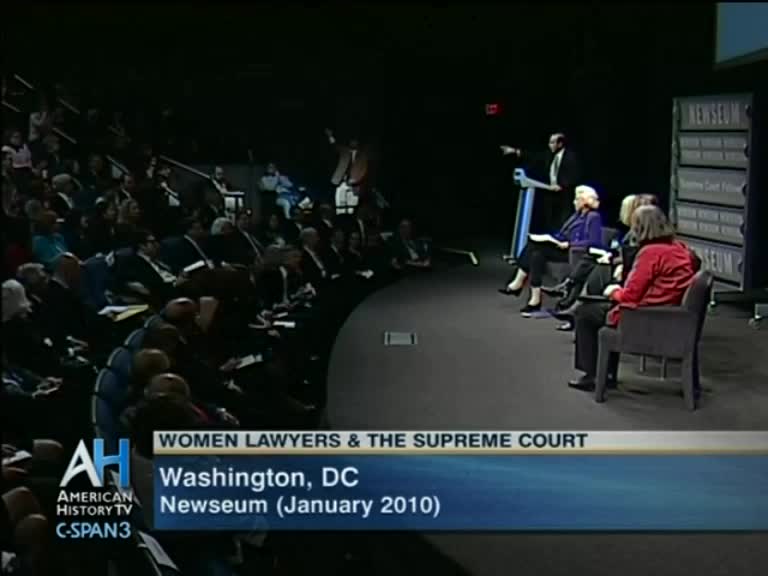Sandra Day O'Connor
This is a great program and it's a topic that I've spent time thinking about over the years. Needless to say,
My chambers window looks out on the Sewell Belmont house that used to be the home of Alice, all the famous suffragette. So I'm reminded when I look out my window of efforts, women may just get the right to vote, much less practice law, and most of the early women legal pioneers faced a profession and a society that espouse what we call the cult of domesticity. Women were different from men, they said and women were fitted for motherhood and home life. They were compassionate, selfless, gentle, moral and pure. And their minds were tuned to art and religion, not logic. Man, on the other hand, were fitted by nature for competition and intellectual discovery in the world. They were battle hardened, shrewd, authoritative and tough minded. Women were thought to be ill qualified for
adversarial litigation, because it requires sharp logic and shrewd negotiation, not to mention exposure that an unjust and the immoral. Now in 1875, the Wisconsin Supreme Court told Lavinia Goodell she could not be admitted to the State Bar. That Chief Justice said the practice of law was unfit for the female character to expose women to the brutal, repulsive and obscene events of courtroom life.
He said would shock man's reverence for womanhood and relax the public sense of decency? Now, in a similar case, Myra Bradwell of Chicago who had studied law with her husband applied to the Illinois bar in 1869, and was refused admission. And the Illinois Supreme Court said as a married woman, her contracts were not binding and contracts were the essence of the attorney client relationship. So of course she couldn't practice law. And the Supreme Court of the United States agreed with the Illinois court. Justice Bradley and I concurring opinion for the Supreme Court cited the natural differences between men and women as the reason why we're Bradwell could not be admitted. And even Clarence Darrow, one of the most famous champions of unpopular causes, addressed and group of women lawyers, and he said, you cannot be shining lights at the bar because you're too kind. You can never be Corporation lawyers because you're not old blooded. You do not have a high grade of intellect. I doubt you can even make a living, said he. Well, another male attorney of the period said a woman can't keep a secret. And for that reason, if no other I doubt I doubt anybody will ever consult a woman lawyer. Well, last
delay for us women lawyers today, our female predecessors had far more spunk and spirit and whip than they were given credit for. Clarence short, rich votes the first woman lawyer in California, and the first woman Deputy District Attorney in America, displayed the characteristic metal of those early women lawyers and opposing attorney once suggested an open court that Clara had better be at home raising children. And Miss both retorted a woman had better be in almost any business than raising such man as you she.
New York woman lawyer pioneer Bella Lockwood was in 1879, the first woman admitted to practice before the Supreme Court of the United States. And to receive that honor she had to try three times to get a special bill passed.
The US Senate changing the admission requirements. She wrote a Three Wheeler all over Washington DC, lobbying the senators and explaining to the press she was going to get a fight all the way up the line. She did. She even ran for president in 1884. Raising that although women couldn't vote, there was nothing to stop them from running for office. Even without women voters she got 4149 votes in that election. Now, we saw an historic first again a few years ago with the confirmation of the first woman Attorney General of the United States, Janet Reno.
And
the Justice Department had a woman assistant attorney general during Warren Harding's administration in 1920. She Her name was Mabel Walker will a brand of Los Angeles. She was given the job of course that no one
The job of Chief chief prosecutor of the prohibition laws.
She became known as prohibition Porsche.
And after nine punishing years at justice, she went back to Los Angeles to practice law. And there were three women who served as FBI agents in the early 1920s. But every one of them subsequently asked to and did resign when J. Edgar Hoover became the director.
Well, I think, you know, during that early era of Susan Brandeis was the daughter of Associate Justice Louis Brandeis, and she argued a case before the Supreme Court in a case involving veterans benefits. And like many skilled attorneys who are before the court, she didn't win. And her father supportive as he was was recused
So, in the mid 20th century, we got more women before the court and they have distinguished themselves in many ways. And now is the time. We're going to get some of these women to talk to us. I'm going to go back to my seat, and we'll engage in conversation from there. Are we all turned on? Can you hear still? Okay.
All right. Now, we're going to start with Wendy Williams over here and ask what you'd like to add to history of women?

